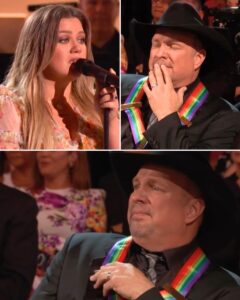Garth Brooks Tears Up, Calls It “Everything” During Kelly Clarkson’s Emotional Performance of “The Dance” at Kennedy Center Honors
At the 43rd Annual Kennedy Center Honors in 2021, the spotlight turned toward one of country music’s most influential and transformative figures — Garth Brooks.
Known for his electrifying performances, record-breaking tours, and a career that has spanned more than three decades, Brooks had not only revolutionized country music but also brought it to audiences across the world in a way that few artists have.
Unlike his usual role as a performer commanding stadiums and arenas, Brooks found himself in the rare position of being honored, celebrated not just for his technical skill but for the cultural and emotional impact he has had on millions of fans.
The evening was dedicated to recognizing his contributions to music, to American culture, and to the hearts of fans who have followed him since the late 1980s. Actor Bradley Cooper set the tone for the night with a heartfelt introduction. “There’s country music, rock, gospel, honky-tonk… and then there’s Garth Brooks,” he said, pausing as the audience absorbed the gravity of his words. “Garth is a power hitter who swung for the fences and shattered the barriers between music genres, forever expanding the vocabulary of country music and changing American culture.” Cooper’s tribute framed Brooks not only as a musician but as a cultural force — someone whose influence extended far beyond the charts, reaching into the lives of ordinary people and fellow artists alike. His words served as a reminder that this night was more than an awards ceremony; it was a celebration of a legacy.
Kelly Clarkson’s Heartfelt Rendition of “The Dance”
The emotional peak of the evening arrived when Kelly Clarkson, one of contemporary music’s most powerful vocalists, took the stage to perform Brooks’ timeless 1990 ballad, The Dance. The performance was stripped down, accompanied solely by a piano, which allowed Clarkson’s voice to carry every ounce of emotion and nuance. Her interpretation was raw, heartfelt, and deeply personal. For Clarkson, The Dance had once served as a source of comfort during moments of heartbreak, making her performance both a personal and public tribute. Every note, every pause, and every crescendo seemed to honor not just the song itself, but the man who had created it.
Clarkson’s delivery captured the delicate balance of strength and vulnerability inherent in Brooks’ songwriting. She managed to convey the bittersweet emotions of loss and love, triumph and regret, that have made The Dance a song that resonates across generations. The performance created a hush over the audience; even seasoned performers and dignitaries in attendance were visibly moved by the purity and emotional depth Clarkson brought to the stage.
A Raw, Unforgettable Reaction from Garth Brooks
As Clarkson’s performance unfolded, the cameras occasionally cut to Brooks, seated beside his wife and fellow country star, Trisha Yearwood. His reaction was unfiltered and profoundly human. Brooks’ eyes shimmered with tears, and he repeatedly wiped his face with his hand, clearly overwhelmed by the moment. Holding his Kennedy Center medallion tightly in one hand — the symbol of his lifetime achievement — Brooks seemed both humbled and deeply touched.
When Clarkson reached the final, soaring notes of The Dance, Brooks could no longer contain himself. In a spontaneous and heartfelt moment, he leapt to his feet, removed his hat, and exclaimed, “Damn!” The reaction was genuine, uncalculated, and powerful, instantly electrifying the room. The audience responded in kind, rising to their feet, applauding not only Clarkson’s extraordinary performance but also the authentic display of emotion from a musical legend. In that instant, the performance transformed from a tribute into a shared, emotional experience between artist, honoree, and audience.
The Wider Significance of the Moment
This performance was widely recognized as one of the most poignant in Kennedy Center Honors history. Brooks, a man whose career has often been defined by spectacle and energy, displayed vulnerability that few fans had witnessed publicly. The contrast between his typically larger-than-life stage persona and the raw emotion he displayed during Clarkson’s tribute amplified the moment’s power. For many viewers, it was a reminder that behind the fame and the records, Brooks is a human being deeply moved by the music and the connections it creates.
Fans took to social media in droves following the performance, sharing clips, reflections, and heartfelt messages. Many praised Clarkson for her ability to inhabit the song so fully, noting that she managed to capture both the essence of Brooks’ original performance and her own personal emotional connection to the lyrics. Others marveled at Brooks’ authenticity, calling it rare to see such a revered performer moved so publicly and unreservedly. Comments flooded platforms such as Twitter, Instagram, and Facebook, with viewers calling it one of the most emotional and memorable Kennedy Center Honors performances ever aired.
One fan summarized the sentiment succinctly: “Kelly sang it like she lived it, and Garth felt it like he wrote it.” The message resonated across the country and even internationally, demonstrating the global impact of both Brooks’ music and Clarkson’s tribute.
A Moment of Connection Between Generations of Artists
The performance also highlighted the intergenerational influence of Brooks’ music. Kelly Clarkson, who rose to fame decades after Brooks began his career, represents a newer generation of artists who were shaped by his work. The mutual respect and admiration evident in the performance underscored Brooks’ enduring relevance in a constantly evolving music industry. It was a rare opportunity for fans to witness two generations of country music greatness — one honoring the other in a deeply human, emotionally resonant way.
A Celebration of Music’s Emotional Power
Ultimately, the Kennedy Center Honors performance served as a testament to the power of music to evoke profound emotion and forge connections between people. Brooks’ tears, Clarkson’s moving vocals, and the audience’s standing ovation together created a moment that transcended entertainment — it became a living, breathing example of how music can reflect our shared human experience. Through this performance, both Brooks and Clarkson reminded the world that music is not just something to hear, but something to feel, something that can move us to tears, laughter, and reflection.
In the end, the 43rd Annual Kennedy Center Honors will be remembered not only as a celebration of Garth Brooks’ extraordinary career but also as a night where artistry, emotion, and genuine human connection converged to create a truly unforgettable experience.



